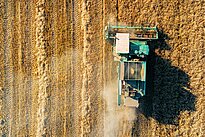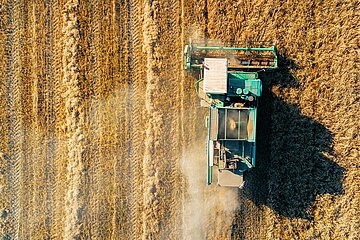Why agroholdings go bankrupt. The case of Ivolga
16 November 2018
Largescaleagriculture.com starts a series of publications on financial distress in big agricultural companies based on evidences from a number of countries. The financial problems of some of the largest Kazakhstan-based agroholdings Alibi, Ivolga, KazExportAstyk and Atameken-Agro have recently become a well-known fact due to a wide coverage in local and international mass media. Their decline became an issue of particular concern for a number of reasons. First, operating about 4 million hectares of the country’s total of 11 million hectares of farmland, these companies are among the world’s biggest land users and agricultural commodity exporters and generate a substantial portion of foreign currency inflows in Kazakhstan. Second, engaging about 75,000 people or 5 % of the population employed in agriculture, they are among the largest employers in Kazakhstan. In addition, these companies received about 1.5 trillion tenge ($ 4 billion) in government subsidies in the past ten years while their total liabilities amount to 1.7 trillion tenge ($ 4.6 billion) nowadays. In the view of the role these enterprises play in the national economy, the government of Kazakhstan had to intervene with its program of financial recovery of agriculture at the beginning of 2013. According to the program, over 400 agribusiness entities,affiliated with the above named agroholdings, received a total of 520 billion tenge ($ 1.4 billion) of additional subsidies for financial recovery in 2013-2015.
How come that the largest and most visible companies, whose owners were (and are) among the wealthiest people in the country, failed to fulfil their financial obligations, thus placing a heavy burden on public finance? The current article attempts to find an answer to this question by delving into the case of the Kazakhstani agroholding Ivolga as one of such financially troubled companies.
Ivolga’s rise to prominence
Ivolga was founded in 1992 as a small grain-trading business by Vasily Rozinov. In 1997, production of grain and livestock products became a major business of the company. In about twenty years, Ivolga grew significantly to operate 1.5 million hectares of farmland, including about 550,000 hectares in Russia. This made the company the second largest crop producer in the world in terms of land use after the Chinese Beidahuang Group with its 5.4 million hectares of land. The total capacity of one-time grain storage at Ivolga’s elevators was estimated at 3 million tonnes in 2015. In addition to crop and livestock production, the company engaged in food manufacturing, cargo transportation, and production of agrochemicals, agricultural equipment and construction materials. Besides, it owned a network of oil depots, gas stations and retail stores, as well as an airline with almost 60 airplanes, a newspaper and a television channel. In early 2000s, the company extended its operations to Russia where it purchased assets in the Kursk, Orenburg, Chelyabinsk and Ulyanovsk regions and engaged in the cultivation of sugar beet and sugar production along with its traditional grain production business. In 2013, Mr. Rozinov was ranked 15th among the top 50 richest Kazakhstani citizens and 10th among the most influential businessmen in the country. His private assets were estimated at $ 329 million in 2015.
Getting into trouble
The news about the financial problems of Ivolga appeared amid its ongoing expansion activity in 2010, when the company tried to restructure a $ 300 million loan taken from the Royal Bank of Scotland in 2007. The problems became more severe in 2015, when dozens of debt claims against Ivolga were filed with arbitration courts in different regions of Kazakhstan and Russia. Financial claims in the amounts of several thousand to several billions of rubles were filed by commercial banks, tax services, suppliers and even regional village councils. The company’s total debt was estimated at about 35 billion rubles ($ 464.5 million).
In March 2016, the Eurasian Development Bank (EDB) filed a bankruptcy claim against Ivolga. The company was on an $ 80 million loan from the EDB to finance its working capital, but did not repay the loan on time. By the time the claim was filed, the loan was more than a year overdue. At that time, Andrei Belyaninov, the EDB’s Chairman of the Board, publicly accused Ivolga of using non-transparent and fraudulent schemes of funds transfers.However, the court did not recognize Ivolga as a bankrupt.
At the beginning of 2018, a long-standing need for restructuring of Ivolga was recognized by its owner, and Olzha Agro took over the management of the company’s assets while Mr. Rozinov reportedly remained the main beneficiary of Ivolga. Besides, Halyk Bank invested 29.6 billion tenge ($ 80 million) in financial recovery of Ivolga. In January 2018, a newly-appointed CEO of the company Aidarbek Khojanazarov initiated talks with Ivolga's creditors and managed to postpone the loan repayment to the EDB under certain conditions. One of them was to ensure transparency of the company’s activities via publication of regular financial reports.
Causes of trouble
In December 2017, Mr. Khojanazarov made an official statement that shed light on the reasons behind Ivolga’s default. According to the statement, theft and highly centralized management were the major causes of failure. Theft was flourishing on numerous subsidiary farms of the company while extremely centralized management of the mother company was ineffective in the monitoring of operations and failed to quickly respond to the problems. In addition, the company had inefficient farming practices. Not a single hectare of the company’s arable land was laid follow in the past ten years. Nor was the land sufficiently fertilized over this period. This led to a severe deterioration of soil quality. Soils were infected with weeds that worsened quality of wheat and led to poor harvest for a number of years. Another reason for poor harvest was terrible quality of seeds. The seeds used were of the sixth generation, which made Kazakhstan's Minister of Agriculture, Umirzak Shukeyev call them ‘garbage’ when he was sharing his opinion on Ivolga’s problems. Additionally, machinery and equipment on the company’s farms were not repaired for about five years. Last but not least, there were several bad years of droughts, fires and other bad weather conditions, which precipitated the crisis.
Getting out of trouble
After getting the situation with debt repayment ‘fixed’, Olzha Agro started improving management practices in the company. The vast land areas of Ivolga were clustered into several sub-holdings of no more than 100,000 hectares each in size based on location and spatial proximity of farms. In addition, new production and monitoring technologies were introduced in crop production. The company implemented the system of precision farming, GPS monitoring, and the use of digital gadgets to control the usage of fuel, fertilizer and seeds. Another key change was the diversification of crop production. The former management of Ivolga focused mainly on the production of wheat. About 90% of the area was used for wheat production before. This exposed the company to market fluctuations, especially in the view of low quality and high price of Kazakhstani wheat in comparison to international competitors.
As a result, the new management team decided to produce a range of new crops that would make it possibleto access new sales markets. Thus, today the company produces oilseeds and fodder crops alongside wheat. According to the estimates of the new management team, if the company had continued producingwheat as a monoculture, this would have resulted in an average return of $ 20 per hectare; whereas, adding new crops into rotation would generate up to $ 50 per hectare. And in conjunction with livestock breeding and meat production, this figure mayeven reach $ 100 per hectare. In livestock production, Olzha Agro is modernizing the herd management and feeding systems. According to Mr. Khojanazarov, modernization has already allowed to increase herd productivity by 15% while the ultimate goal is to improve it by 25 %.
Lessons learned
Agriculture is a highly volatile business characterized by weather and market fluctuations, as well as instable policies. This poses high requirements toward governance and management of agricultural enterprises, especially if these enterprises are large to the extent that their decline is likely to have far-reaching effects on the society. The case of Ivolga demonstrates how a failure to establish transparent corporate governance systems in conjunction with old-style management practices can lead to a further build-up of already existing problems. Under such circumstances, a single adverse event, such as drought during vegetation or the collapsing currency, would be enough to make an enterprise fall into a decline while a subsequent remedial action always comes at a price.







